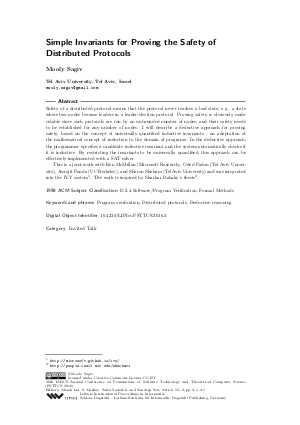Simple Invariants for Proving the Safety of Distributed Protocols (Invited Talk)
Author Mooly Sagiv
-
Part of:
Volume:
36th IARCS Annual Conference on Foundations of Software Technology and Theoretical Computer Science (FSTTCS 2016)
Part of: Series: Leibniz International Proceedings in Informatics (LIPIcs)
Part of: Conference: IARCS Annual Conference on Foundations of Software Technology and Theoretical Computer Science (FSTTCS) - License:
 Creative Commons Attribution 3.0 Unported license
Creative Commons Attribution 3.0 Unported license
- Publication Date: 2016-12-10
File

PDF
LIPIcs.FSTTCS.2016.2.pdf
- Filesize: 235 kB
- 1 pages
Document Identifiers
Subject Classification
Keywords
- Program verification
- Distributed protocols
- Deductive reasoning
Metrics
- Access Statistics
-
Total Accesses (updated on a weekly basis)
0PDF Downloads0Metadata Views
Abstract
Safety of a distributed protocol means that the protocol never reaches a bad state, e.g., a state where two nodes become leaders in a leader-election protocol. Proving safety is obviously undecidable since such protocols are run by an unbounded number of nodes, and their safety needs to be established for any number of nodes. I will describe a deductive approach for proving safety, based on the concept of universally quantified inductive invariants—an adaptation of the mathematical concept of induction to the domain of programs. In the deductive approach, the programmer specifies a candidate inductive invariant and the system automatically checks if it is inductive. By restricting the invariants to be universally quantified, this approach can be effectively implemented with a SAT solver. This is a joint work with Ken McMillan (Microsoft Research), Oded Padon (Tel Aviv University), Aurojit Panda (UC Berkeley), and Sharon Shoham (Tel Aviv University) and was integrated into the IVY system. The work is inspired by Shachar Itzhaky's thesis.
Cite As Get BibTex
Mooly Sagiv. Simple Invariants for Proving the Safety of Distributed Protocols (Invited Talk). In 36th IARCS Annual Conference on Foundations of Software Technology and Theoretical Computer Science (FSTTCS 2016). Leibniz International Proceedings in Informatics (LIPIcs), Volume 65, p. 2:1, Schloss Dagstuhl – Leibniz-Zentrum für Informatik (2016)
https://doi.org/10.4230/LIPIcs.FSTTCS.2016.2
BibTex
@InProceedings{sagiv:LIPIcs.FSTTCS.2016.2,
author = {Sagiv, Mooly},
title = {{Simple Invariants for Proving the Safety of Distributed Protocols}},
booktitle = {36th IARCS Annual Conference on Foundations of Software Technology and Theoretical Computer Science (FSTTCS 2016)},
pages = {2:1--2:1},
series = {Leibniz International Proceedings in Informatics (LIPIcs)},
ISBN = {978-3-95977-027-9},
ISSN = {1868-8969},
year = {2016},
volume = {65},
editor = {Lal, Akash and Akshay, S. and Saurabh, Saket and Sen, Sandeep},
publisher = {Schloss Dagstuhl -- Leibniz-Zentrum f{\"u}r Informatik},
address = {Dagstuhl, Germany},
URL = {https://drops.dagstuhl.de/entities/document/10.4230/LIPIcs.FSTTCS.2016.2},
URN = {urn:nbn:de:0030-drops-68877},
doi = {10.4230/LIPIcs.FSTTCS.2016.2},
annote = {Keywords: Program verification, Distributed protocols, Deductive reasoning}
}
